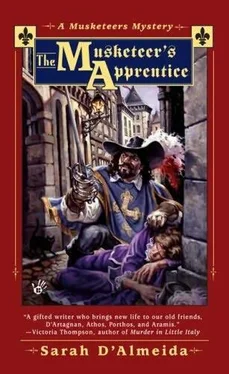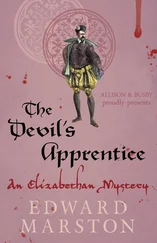Sarah D'Almeida - The Musketeer's Apprentice
Здесь есть возможность читать онлайн «Sarah D'Almeida - The Musketeer's Apprentice» весь текст электронной книги совершенно бесплатно (целиком полную версию без сокращений). В некоторых случаях можно слушать аудио, скачать через торрент в формате fb2 и присутствует краткое содержание. Жанр: Триллер, на английском языке. Описание произведения, (предисловие) а так же отзывы посетителей доступны на портале библиотеки ЛибКат.
- Название:The Musketeer's Apprentice
- Автор:
- Жанр:
- Год:неизвестен
- ISBN:нет данных
- Рейтинг книги:4 / 5. Голосов: 1
-
Избранное:Добавить в избранное
- Отзывы:
-
Ваша оценка:
- 80
- 1
- 2
- 3
- 4
- 5
The Musketeer's Apprentice: краткое содержание, описание и аннотация
Предлагаем к чтению аннотацию, описание, краткое содержание или предисловие (зависит от того, что написал сам автор книги «The Musketeer's Apprentice»). Если вы не нашли необходимую информацию о книге — напишите в комментариях, мы постараемся отыскать её.
In a search for his apprentice's killer, Musketeer Porthos rallies his friends to discover who was responsible, pursuing the truth even as he puts his own life in danger.
The Musketeer's Apprentice — читать онлайн бесплатно полную книгу (весь текст) целиком
Ниже представлен текст книги, разбитый по страницам. Система сохранения места последней прочитанной страницы, позволяет с удобством читать онлайн бесплатно книгу «The Musketeer's Apprentice», без необходимости каждый раз заново искать на чём Вы остановились. Поставьте закладку, и сможете в любой момент перейти на страницу, на которой закончили чтение.
Интервал:
Закладка:
Aramis walked in, and genuflected to the Christ, before clearing his throat loudly, causing echoes to chase each other into the small church. A small man, brown like a nut-the curious brown of small people shrunken by age and tanned by the sun-and crowned with silver hair, emerged from within a little chamber to the side, doubtless the sacristy. He looked at the four of them-all of them clutching plumed hats to their chests-as though he’d never seen such hats or such men. In fact, as though he lived in a completely different world, populated perhaps with angels, or perhaps with more humble creatures who lived day to day, and more close to the land.
“Oh, Father, we’ve come on an errand of enquiry,” Aramis said. “We wish to know-”
But the priest was looking past them, to the giant Porthos, standing taller than any of the others and looking as if he wished he could shrink his bulk to the church’s proportions. The priest’s glance slid over Porthos, clearly not recognizing him, and looked away, and back at Aramis.
“Any way I can help you, my son,” he said, and continued looking at Aramis as though Aramis were an amazing creature, perhaps an apparition of miraculous nature.
“There was a boy who came,” Aramis said. “No more than a few weeks ago. Looking for information about the lord’s family.”
“Oh,” the priest said, and smiled. “The lord’s grandson. He told me. He said the lord didn’t receive him, which is a pity. Very proud all that family. Very proud.”
Porthos had sidled away from the group to where a tomb stood, carved in rock, displaying, atop its bulk, a knight, crudely carved, lying with his hands joined at the chest. Though the carver who had executed the work displayed no more skill than would have been needed to shape stones for construction, something about the knight-its massive proportions, its huge hands-seemed to speak of a familial relation with Porthos.
D’Artagnan hedged after him, even as Athos and Aramis followed the priest into some back room of the church.
Porthos was running his finger, pensively, around the carved boot of the knight, presumably his ancestor. He looked up to meet D’Artagnan’s gaze, as D’Artagnan approached, and D’Artagnan was surprised to see the grey eyes glisten with tears.
“The priest doesn’t know you,” he said, in a casual tone. “Was he installed after you left?”
Porthos shook his head, and something very much like a small smile twisted his lips. “Oh, no,” he said. “He’s the priest who baptized me, but I daresay he rarely sees my father. He would be more likely to recognize me if he saw him.”
D’Artagnan was sure his features reflected the purest confusion, because Porthos chuckled. “D’Artagnan when I left here I was just seventeen. Oh, I was large, for my age, as I could be. But my body lacked the bulk of muscle it would later acquire. And my features had not yet set, fully, in their adult form. My father looks more as I do now than I looked when I left here.”
D’Artagnan nodded, understanding, but the expression of affliction and confusion threatened to return to Porthos’s face and sometimes it seemed to D’Artagnan he would rather do anything-anything at all-than face a serious Porthos or a Porthos who tried to seriously think through something as difficult as his own feelings. So he said, quickly, “Your father didn’t attend church?”
Porthos shrugged. “Oh, he did and didn’t. He had not been much of a church man after my mother died. I never knew my mother, so I can’t tell you much, but Marie told me that she was a beautiful woman with hair like gold and I…” He blushed a little. “In my mind she looks a lot like Athenais. Marie said that she and my father had a child every other year for years, and none of them lived to take the first breath. And then I was born and my mother died. Marie said my mother was tired of giving birth to so many children and didn’t stay to hear whether I was alive, because she couldn’t bear to hear I had died, also. I think…” He shrugged. “I think it was rather the size of my head and of my shoulders. The du Vallons kill wives. And mothers. A wonder that Amelie didn’t die of Guillaume.” He frowned. “And perhaps not a mercy.”
And here, he was going again, back to Guillaume, which D’Artagnan guessed was the source of those tears glistening in his eyes, and of that expression of desolation on his features. D’Artagnan opened his mouth, but Porthos lifted a hand. “Leave it be, D’Artagnan, leave it be. It is well enough. Some grief must be felt, sometimes. Else, it damns up inside and bursts out as rage. Look at our friend, Athos.” He shook his head. “I will mourn Guillaume. I will reconcile myself to his death, but… D’Artangnan, I wish I could bring him back to du Vallon for burial. Out back there, in the general cemetery there is a small plot, enclosed in a wall. There my ancestors lie. There my mother rests. I would like Guillaume to lie there, under the name du Vallon. I couldn’t give it to him in life, but I think at the end of it all, when we’re ourselves, he deserves to rest under it.” He stopped and swallowed and looked away, at the narrow window on the wall, and at the light shaft that came through it to illuminate a confusion of dancing dust motes.
“Why shouldn’t he?” D’Artagnan asked. “We’ll travel back with you and with the coffin. Surely it can be made ready for travel. Surely. You know that people bring bodies back from war to rest in their homeland.”
“Oh, it’s not that,” Porthos said. “It is my father. He’d never allow it.” He smiled, a brief baring of teeth with no joy at all. “If it comes to that, I’m not sure he’ll allow me to rest there, when my time comes.”
The curate and Aramis emerged from the little room at the back, followed by Athos.
“To be honest, I never understood why the young lord was so excited. And of course, he was the young lord, whatever the old lord might have said. He was one of those young men who had his paternity written on his face. Looked just like his father when I taught him his prayers. But you see, he said his father was dead, and therefore he would surely have inherited when his grandfather died.” He frowned slightly. “Not that several cousins and others, who have been looking to the inheritance as already theirs wouldn’t take it upon themselves to challenge it, but with both parents dead, and the child so clearly young master Pierre’s son, I don’t think anyone could have carried a challenge very far.”
“There are cousins, then?” Aramis asked, all gentle and detached interest. “Who might have an interest in the land? But surely until you got word from the lord’s grandson no one would have thought the lord’s son had died, would they?”
“Well…” the little priest shrugged, which seemed more like an all-enveloping movement of too-bony shoulders enclosed in a voluminous black garment. “Ah,” he said. “That. You see, the lord’s son was sent to the capital… thirteen years ago, it would be. And for a long time there were no letters, and then, five years ago, a single letter from him to Rouge, as runs the mills. And you see, it’s not natural to be gone that long without sending word.”
“But surely,” Aramis said. “The first letter came after seven years absence. And besides, I understand Lord du Vallon can’t read or write.”
“No he can’t,” the little priest said, and grinned, the happy grin of a small man who nonetheless holds something over a much larger one. “He thinks that reading and writing effeminates you, he says. He says it would turn him into a priest or a cleric and make him less than a man.” He shook his head. “Nor could the younger lord, but yet, I hear it’s not all that difficult to get someone to write a letter for you, in Paris. Nor is it that hard for the lord to get one of his servants to read it. But there hasn’t been word for years and years, save that one letter… and who knows if that was even true?” He shrugged again. “The letter, they said, said that the Lord Pierre had left his name and this very successful school of fencing and dancing he’d funded in the capital, and had become a musketeer-” he looked around at them. “As you are, monsieurs. But the truth is, people from St. Guillaume do go to Paris. Not often, it is true, but they do go. And those that went and asked around said there was no du Vallon in the musketeers. And see… I think that letter was sent by someone for some purpose I can’t but guess.” His voice climbed, into reed-thin registers, as he said. “They say Paris is all plots and counter-plots and it would drive a man mad to live there and try to understand them. And I say someone wanted us to believe that the Lord Pierre was still alive in Paris. Perhaps one of the lord’s cousins, waiting on the inheritance and hoping that no one would dispute it till then?”
Читать дальшеИнтервал:
Закладка:
Похожие книги на «The Musketeer's Apprentice»
Представляем Вашему вниманию похожие книги на «The Musketeer's Apprentice» списком для выбора. Мы отобрали схожую по названию и смыслу литературу в надежде предоставить читателям больше вариантов отыскать новые, интересные, ещё непрочитанные произведения.
Обсуждение, отзывы о книге «The Musketeer's Apprentice» и просто собственные мнения читателей. Оставьте ваши комментарии, напишите, что Вы думаете о произведении, его смысле или главных героях. Укажите что конкретно понравилось, а что нет, и почему Вы так считаете.










